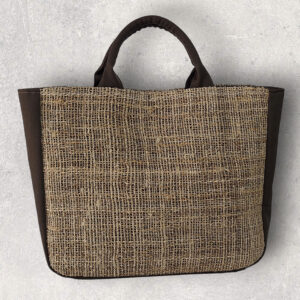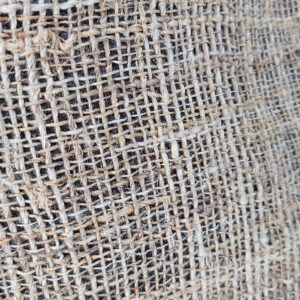先日、こんなバッグを作りました。ネパール産の大麻(ヘンプ)を粗く織った布を表地に使っています。大麻――!? そうです! あの悪名高き大麻です。「大麻」といえば、とても悪いイメージがありますが、かつては栽培が推奨されるほど、私たちの暮らしに有益な植物でした。ところが、悪用されることにだけ注目された結果、昭和23年に大麻取締法が施行されると、特殊な利用を除き、日本の暮らしから大麻は消え失せ、2000近くあった農家はほぼ失われてしまいました。
そんな大麻がネパールでは自生(野生化?)しているそうです。もちろん、悪用することは許されませんが、自生しているものを加工して「 ワイルド ヘンプ 」として製品にしているようです。このバッグは、それで作ったものです。



ひとつ屋には、そんなネパールから来たスタッフがいます。ニックネームはビジャ君。とにかく真っすぐな性格と美しい瞳が印象的な好青年です。
最近、テレビを見ていると「良質な外国人労働者をどう確保するか」などのニュースや番組をよく見かけます。今、アジアの先進国で“良質な外国人労働者”を奪い合っているんだとか—。ビジャ君とともに働いていて、まるで物のように“良質な”という言葉が人に用いられるのを悲しく思います。かつての奴隷貿易のように、今なお安い労働力を奪い合う国々――。
途上国の若者を奪い合うのではなく、彼らが海外で働かなくてもよいように“母国で仕事ができる環境”を作り出すことが、私たちの国にとっても重要なことであるように思います。主たる産業が農業であるネパール。美しい国土や環境、文化や歴史、さらには自尊心を保ちながら生きることが新しい産業や国のあり方のような気がしてなりません(以前のブログ『ネパール募金』もご覧ください)
それはハンドメイドの小さな小さなバッグではありますが、草木染と融合することで何か大きな可能性を秘めているような気がしています。
何より、私はこれをライフワークの一つして生きていきたいと思っています。
※何をもって「先進国」と「途上国」という分類をするのかは疑問ですが、上記の文章では旧来の意味で用いています。
I made this bag the other day. The outer material is made of coarsely woven hemp from Nepal. Hemp is that infamous marijuana.
Although this plant has a bad image like this, it was once a beneficial plant indispensable to daily life in Japan, where cultivation was recommended. However, as a result of focusing only on misuse, when the “Marijuana Control Law” was enacted in 1948, cannabis disappeared from our lives except for special uses. And nearly 2,000 hemp farmers were lost.
hemp(marijuana) grows naturally in Nepal. Of course, it is not allowed to abuse it, but it seems that wild hemp is processed and made into a product as “wild hemp”. This bag is made with it.
Our workshop has a staff from Nepal. Nickname is Bija. Anyway, he is a good young man with a straight personality and beautiful eyes.
Recently, when I watch TV, I often see news programs such as “How to secure good quality foreign workers.” Now, it seems that developed countries in Asia are scrambled for “good quality foreign workers”. Working with Bija I feel sad that they are represented as an object. Like the slave trade of the past, the great powers are now competing for labor.
Instead of competing for young people in developing countries, we need to create an environment in which they do not have to work abroad. I think it will be beneficial for my country in the future. Currently, Nepal’s main industry is agriculture. I believe that it is a very important role for companies (industries) and the country to live while protecting the beautiful land, environment, culture, history, and self-esteem.
It’s a very small hand-made bag, but I feel that it has great potential by combining it with vegetable dyeing.
I will continue to do my best to make this happen! I would like to make this one of my life’s works for the rest of my life.
※ I don’t know what I use to classify “developed countries” and “developing countries”, but I use them in the old sense in the above sentence.
※ It is very difficult to express my thoughts in a foreign language. I am sorry that my English is so bad.
前幾天我做了這個包。 外部材料採用來自尼泊爾的粗紡大麻。 由於大麻也是非法藥物,因此日本禁止種植。 然而,在曾經推薦種植的日本,它是一種重要且有益的植物。 由於只注重濫用,1948年《大麻管制法》頒布後,大麻除了特殊用途外,就從我們的生活中消失了。 近 2,000 名大麻種植者損失慘重。
尼泊爾野生大麻。 當然,濫用是不允許的,但似乎野生大麻被加工並作為“Wild hemp”商業化。 這個包包就是用它製作的。
我們的車間有來自尼泊爾的員工。 他的暱稱是Bija。 不管怎樣,他是一個性格耿直、眼睛漂亮的好青年。
最近,我看電視時經常看到有關如何確保高素質外勞的新聞節目。 現在,亞洲發達國家似乎都在爭奪“高素質外籍工人”。 與 Bija 一起工作時,我對它們被表現為物體感到難過。 就像古代的奴隸貿易一樣,大國現在也在爭奪勞動力。
我們不需要在發展中國家爭奪年輕人,而是需要創造一個讓他們不必在國外工作的環境。 我相信這將符合我們國家未來的國家利益。 目前,尼泊爾的主要產業是農業。 我不禁感到,在保護我們美麗的土地、環境、文化、歷史和自尊的同時生存,才是新的產業之道、國家之道。
這是一個很小的手工包,但我覺得它與植物染色結合起來有很大的潛力。
我們將繼續為實現這一目標而竭盡全力!我想把它作為我一生的作品之一。
* 我不知道你用什麼來分類“發達國家”和“發展中國家”,但我在上面的句子中使用了舊意義上的它們。
* 用外語表達我的想法是非常困難的。對不起,我的台灣語不好。